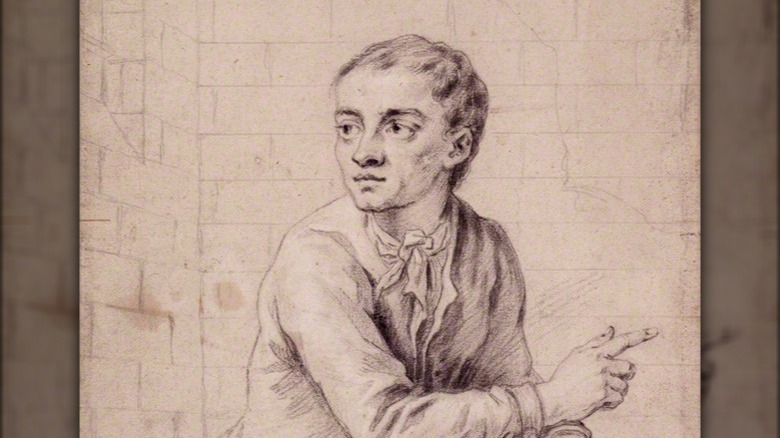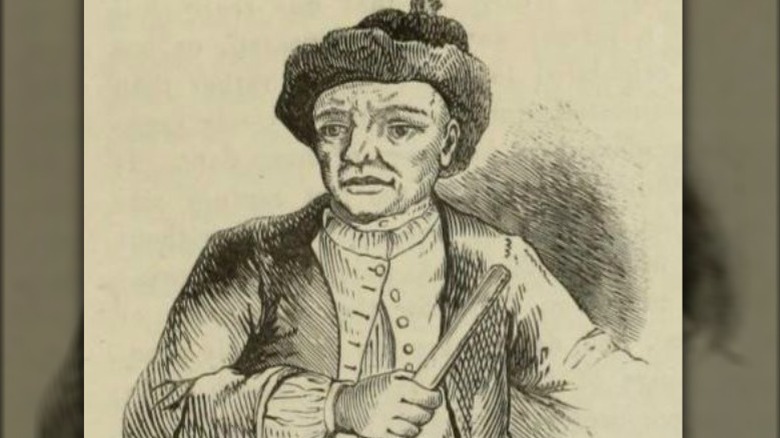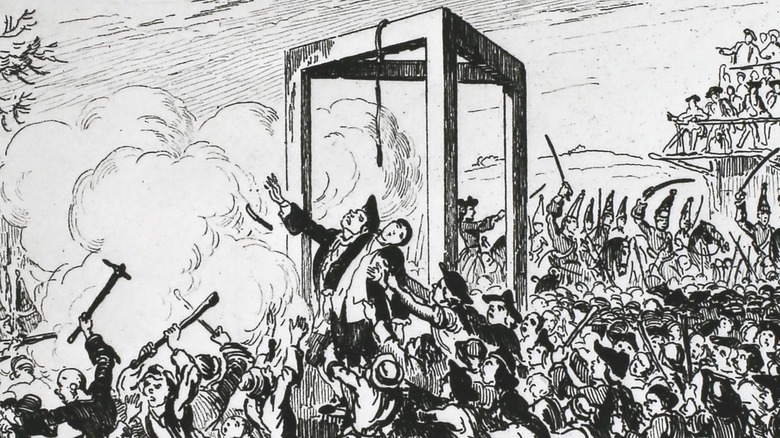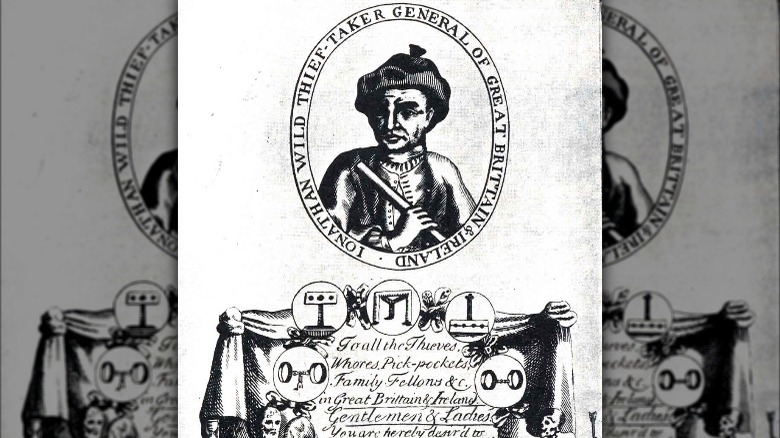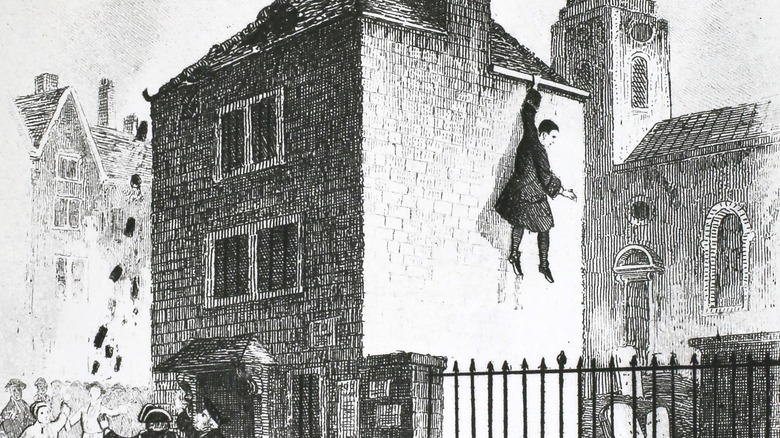The Relationship Between Master Thief Jack Sheppard And Lawman Jonathan Wild Explained
In 1724, in the span of mere months, Jack Sheppard, a roguish burglar and thief, became the darling of London thanks to a series of high-profile prison escapes. The press breathlessly reported on his exploits, the city's elite visited him in prison, and London's working-class lauded him as a hero, per the BBC. The man in charge of putting him behind bars, Jonathan Wild, wasn't so enthralled by Sheppard's exploits for two excellent reasons.
As the city's thief-taker general, a sort of bounty hunter employed by crime victims before the existence of a police force, Sheppard's very public exploits made Wild look bad (per NPR and "The Life of Lord Chancellor Hardwicke"). More importantly, Wild led a double life as a both a lawman and the head of a vast criminal organization, and Sheppard refused to come to heel or even recognize Wild's authority as the head of London's underworld, per Extra History. Soon, Wild beat his nemesis, but he paid a heavy cost for his success.
Who Was Jack Sheppard?
In 1724, Jack Sheppard was 22, stood 5-foot-4-inches, was strong and wiry, and was quick of hand, foot, and mind, according to Historic UK. He was born incredibly poor in 1702, raised by a single mother at a workhouse in a London slum where the city's impoverished labored for room and board (per Britannica and Reynolds's News and Miscellany). Even so, he learned to read and write and became an apprentice woodworker, a skill he would later use to great advantage for more nefarious ends.
Sheppard fell into crime after hooking up with a sex worker named Elizabeth Lyon, aka Edgworth Bess, and began spending his time in a seedy tavern called the Black Lion, a haunt of the city's criminal class (per Historic UK and the BBC). His criminal career was going well until he crossed Jonathan Wild, who was hired by one of Sheppard's victims to apprehend the wily thief.
Jonathan Wild's Double Life
Jonathan Wild had a good thing going until Jack Sheppard came along. He had the market cornered on crime in London thanks to an ingenious business model. On the public-facing side of his career, Wild captured criminals, recovered stolen property, and received a reward for both services, according to Reynolds's News and Miscellany. On the underworld side, he had a vast network of thieves working for him. He would return the stolen goods to the victims for a price and turn in any criminals he considered competition, sending as many as 75 men to the gallows during his tenure, per "The Pleasures of the Imagination."
Wild was born in 1682 and abandoned his wife and children for a life of crime in London, according to Britannica. He was a master organizer and adept at marketing and self-promotion, skills he used to build both sides of his career. But once his life became entwined with Sheppard's, his world slowly crumbled. After Wild first apprehended Sheppard, the younger thief pulled a series of daring escapes, each more intricate than the last, per Historic UK. And with each escape, the public's adulation soon swung away from Wild to shine on Sheppard.
Jack Sheppard's End
Whether shackled to the jail floor or covered in chains in a high tower, Jack Sheppard kept escaping, and Jonathan Wild kept catching him (per the BBC). On November 16, 1724, Sheppard was taken from his prison cell at Newgate and brought to Tyburn — where many public executions took place — to be hanged (per Britannica). By this time, the prisoner was a celebrity, and there were about 200,000 people there to watch the execution, per the BBC. Many tossed flowers at Sheppard as he drank ale on the way to the gallows, per "Underworld London" and the BBC.
He had one final great escape worked out with the writer Daniel Defoe of "Robinson Crusoe" fame, who ghost-wrote Sheppard's autobiography. Defoe and his publisher planned to take Sheppard down from the scaffold as soon as possible and attempt to revive him, but members of the crowd unknowingly yanked on Sheppard's legs to make sure he had a quick and painless death, per Historic UK.
Jack Sheppard's Revenge
Jack Sheppard's criminal cohort, Joseph "Blueskin" Blake, slashed Jonathan Wild's throat with a penknife while on trial, according to "The Life of Lord Chancellor Hardwicke." While Wild recovered, he was never the same. With the execution of his nemesis, the public turned against the thief-catcher, and he was eventually convicted of a felony related to the criminal side of his business and sentenced to death. On May 24, 1725, he, too, left his prison cell and headed to Tyburn. Unlike the execution of Sheppard, the crowd waiting to see Wild die chucked dead animals, feces, and stones at him on his way to the gallows, per "Underworld London."
Even after his death, Jonathan Wild's reputation fared badly. In the various plays, songs, and books inspired by the life and times of Jack Sheppard, Wild was continually villainized. His criminal empire even inspired one Henry Fielding, the author of "The History of Tom Jones, A Foundling," who wrote a satirical novel about Jonathan Wild that was published in 1743. But perhaps more importantly, as a magistrate, Fielding helped create London's first professional police force, the Bow Street Runners, because of the scandals involving Wild and other thief-takers, per Historic UK.
The Aftermath
Jack Sheppard remained a folk hero, what one historian called "a darling of the mob," for generations (per "A 'Darling of the Mob': The Antidisciplinarity of the Jack Sheppard Texts." He had a huge resurgence in popularity more than 100 years after his death thanks to the author William Ainsworth, whose 1839 book "Jack Sheppard: A Romance" became a runaway bestseller because of England's working class, who couldn't get enough of Sheppard's exploits. Per "Thief-Taker General," theatrical productions about his life began popping up and continued well into the turn of the century,
Even today, whenever you hear Bobby Darin's or Ella Fitzgerald's swinging versions of Kurt Weill and Bertolt Brecht's song "Mack the Knife," you're humming along to a tune inspired by Jack Sheppard's exploits, per Straz Center. While Jack Sheppard became a folk hero — not only for his daring escapes but perhaps for his boyish looks and roguish ways — Jonathan Wild remained a villain since he was likely seen as a worse criminal for his corruption and two-faced cynicism.

